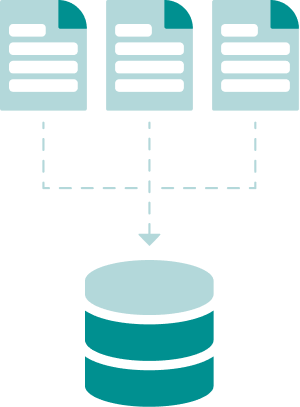The State of
Corporate Sustainability
Operating buildings with efficiency
and sustainability at the forefront
Welcome to our annual State of Corporate Sustainability Report in partnership with Smart Energy Decisions (SED).
This report represents our sixth collaboration, offering a comprehensive look at the latest trends, key drivers, and challenges shaping the work of energy, facility, and sustainability teams today.

Our Approach
The data within this report reflects the experience and insights from 200+ industry professionals working in multiple sectors surveyed in the fall of 2024:


The Journey Towards Sustainable Spaces: Insights by Organizational Role and Journey Stage
This year’s survey data reveals key trends in participation and decision-making across various organization types. While 66% of respondents are actively involved in corporate sustainability initiatives, these results show a slight decline from previous years. However, decision-making still remains highly centralized, with 11% of team members involved, indicating the importance and progress still needed to empower both individuals and teams to be part of the sustainability journey.
Survey insights highlight the importance of empowering individuals and tailoring resources to organizations at different stages of their sustainability journey by encouraging team members to focus more on sustainability.
Sustainability progress has been speeding up across many businesses and organizations in recent years. The 2024 survey data reveal organizations remain confident in setting sustainability goals, but also at a slower trajectory compared to previous years. This slowdown may be due to delayed federal sustainability mandates and the changing political climate. Consequently, teams might focus more on reduction initiatives that drive both cost and carbon savings rather than for compliance and reporting, slowing overall progress in the next few months and years to come.
63% of respondents report being on track or ahead of pace, but only 8% are truly exceeding expectations. Additionally, 22% are still in the early stages of their sustainability journey, signaling a need for foundational support and guidance.
Using Building Data as a Compass to Guide Us Towards a More Sustainable Future
Buildings significantly contribute to global energy consumption and carbon emissions, making them a key focus for sustainability. Data enables teams to make informed decisions, track progress, and adapt to changing energy demands. In today's landscape, data is essential for guiding us toward a sustainable future.
Multiple methods are used for data management. For the first time this year, we asked our respondents to tell us more about how they’re managing their data. Survey data shows that 60% of organizations have centralized data management; this method is especially prevalent among commercial entities (78%). However, 46% still rely on separate departmental management, common in higher education (64%) which may hinder progress. Third-party data management is rare (13%) but slightly more common in commercial organizations and advanced programs.
Simply put, you can’t manage what you don’t measure—and in today’s landscape, data isn’t just a tool; it’s the compass guiding us toward a more sustainable future.
| Total | Commercial | Higher Education | Industrial | Government | |
|---|---|---|---|---|---|
| Centralized | 60% | 78% | 45% | 68% | 48% |
| Managed by separate departments | 46% | 35% | 64% | 43% | 67% |
| Third-party management | 13% | 18% | 7% | 10% | 15% |
| Other | 2% | 3% | 0% | 3% | 4% |
Organizations Increasingly Rely on Robust Data Access and Automation to Scale their Impact
Using energy and sustainability data is now essential for organizations to save time and money. Despite rising energy costs and compliance pressures, many still rely on manual processes or fragmented systems to track usage and emissions.
With automation leading the way, 51% of respondents use automation tools to manage their data. However, over half still use manual methods like bill processing (50%) and almost one-third use meter readings (31%).

Access to building and supplier data, along with automation in utility data management, was crucial for advancing sustainability strategies in 2024. Among respondents, 79% identified building and asset-level data as highly important.
Similarly, 73% of respondents see automation in utility data management as highly important, leaning in on the importance of reducing manual processes and increasing efficiency.
Question: Which of the following tactics is important for the success of your overall sustainability strategy.
Strong energy and sustainability data help organizations forecast accurately, prioritize impactful initiatives, and confidently meet stakeholder demands - all while freeing up valuable time for teams to focus on strategic growth. These findings highlight a clear trend: as organizations mature in their sustainability journeys, they increasingly rely on robust data access and automation to scale their impact.
Year-over-year Differences
A new focus this year is access to supplier data, which 62% of respondents deemed essential for achieving sustainability goals. This growing priority reflects an evolving recognition of the role suppliers play in an organization’s broader environmental impact. By incorporating supplier data into their sustainability strategies, organizations are gaining a more comprehensive view of their value chain, enabling them to align their efforts with broader ESG goals, optimizations, and cost reduction strategies.
Widespread Commitment to Sustainability and ESG Reporting
The shift underscores a broader movement that empowers organizations to not only track progress but also collaborate more effectively to drive meaningful, long-term change including:
Near-universal sustainability goals: It is significant that 97% of responding organizations have committed to sustainability or energy reduction goals, showing broad alignment across sectors and roles. This demonstrates the widespread prioritization of environmental objectives in organizational strategies.
Resource reduction as the top priority: Resource reduction, including energy, water, and waste, is the most common focus area, cited by 83% of respondents. This indicates a strong emphasis on optimizing resource usage to meet sustainability targets.
ESG reporting on the rise: Commitment to ESG reporting has climbed to 61% in 2024, compared to 60% in 2023. These results show that a majority of organizations are progressively incorporating sustainability into formal reporting frameworks.
Question: Which of the following sustainability or energy reduction goals is your organization committed to achieving?
Scaling Up and Up
As organizations navigate carbon accounting, the allocation of resources has become a differential in achieving success. Whether allocating team or financial resources, these allocations reveal much more about an organization’s priorities, challenges, and goals. The recent survey data shows not only how much organizations are willing to invest, but also how these investments align with their sustainability journey and fellow industry benchmarks.
Question: How much budget does your organization have to spend on resources to support your carbon accounting and sustainability reporting?
Responses by industry:
| Budget | Total | Commercial | Higher Education | Industrial | Government |
|---|---|---|---|---|---|
| $0 | 16% | 23% | 24% | 5% | 15% |
| $1-9k | 13% | 13% | 19% | 5% | 11% |
| $10k-25k | 12% | 5% | 21% | 8% | 7% |
| $26k-50k | 8% | 8% | 10% | 5% | 7% |
| $51k-75k | 4% | 8% | 2% | 3% | 0% |
| $76k-$99k | 5% | 0% | 5% | 8% | 11% |
| $100-$249k | 14% | 20% | 12% | 20% | 7% |
| $250-$499k | 9% | 13% | 0% | 13% | 15% |
| $500k+ | 18% | 13% | 7% | 35% | 26% |
Responses by stage on the sustainability journey:
| Title | Total | Ahead/On Track | Behind | Starting |
|---|---|---|---|---|
| $0 | 16% | 12% | 7% | 24% |
| $1-9k | 13% | 11% | 11% | 18% |
| $10k-25k | 12% | 9% | 18% | 14% |
| $26k-50k | 8% | 9% | 7% | 8% |
| $51k-75k | 4% | 4% | 7% | 4% |
| $76k-$99k | 5% | 8% | 0% | 6% |
| $100-$249k | 14% | 16% | 14% | 12% |
| $250-$499k | 9% | 10% | 14% | 6% |
| $500k+ | 18% | 23% | 21% | 8% |
Higher Budgets Create A Higher Chance of Success
Organizations are allocating larger budgets to carbon accounting and sustainability reporting, with 19% dedicating $500k or more in 2024, driven by advanced organizations and the industrial sector.
Higher budgets are most common among those "Ahead / on Track" in their sustainability journey, while newcomers operate with lower budgets.
These resources drive successful energy and sustainability strategies, requiring transparency between strategic investment, stakeholder alignment, and operational efficiency.
Question: Which of the following factors are important to the success of your energy optimization or sustainability program?

These results suggest that resources are crucial for successful initiatives, prioritized by 78% of respondents. Like last year, there was little change in uncertainty about success factors, indicating consistent trends in strategic clarity and goals.
Elevating Sustainability Success and Reporting
Organizations can confidently navigate reporting complexities and build trust by harnessing the right data. Data not only informs decisions but also validates success, showing stakeholders that optimizing your portfolio saves time, energy, and costs while contributing to a sustainable future.
New for 2024, we asked respondents the following to not only see if teams are collecting energy and sustainability data but how they are using their data to guide their goals and strategies.
As organizations align with global sustainability standards, integrating energy and sustainability data reveals both progress and challenges. Survey results show a broad spectrum of maturity: 27% of organizations are "ahead of the crowd" or "well on their way," while 47% remain in the early stages, focusing on automation or manual processes.
Question: Which of the following best describes where your organization is on the journey in using energy and sustainability data?
From securing organizational buy-in to fostering leadership alignment, energy and sustainability teams are navigating a complex journey to reach their sustainability goals.
2025 and Beyond
Looking ahead to 2025 and beyond, sustainability and energy teams across organizations are bound to face new priorities and challenges as the global political landscape continues to evolve. However, one constant remains: optimizing data and managing your building portfolio efficiently will be essential for navigating both current and future goals.
Regardless of the ever-evolving global and political landscape, creating more efficient spaces not only ensures cost savings, but also drives performance improvements and aligns with broader goals for environmental and economic sustainability. By focusing on optimizing and centralizing data, organizations can maintain momentum on their sustainability journey, and demonstrate tangible success to stakeholders. The future may be uncertain, but the power of data to optimize and transform buildings will be key, 2025 and beyond.
About Atrius
Atrius is part of Acuity’s Intelligent Spaces business segment. The mission of the Acuity Intelligent Spaces team is to make spaces smarter, safer and greener through our strategy of connecting the edge with the cloud using disruptive technologies that leverage data interoperability.
Our suite of Atrius applications and data platform connect thousands of buildings, interact with millions of people, and manage billions of square feet of real estate around the world every single day. We deliver solutions that optimize building performance, streamline enterprise operations, and enhance how people interact with spaces.
About Acuity Brands
Acuity Brands, Inc. (NYSE: AYI) is a market-leading industrial technology company. We use technology to solve problems in spaces, light, and more things to come. Through our two business segments, Acuity Brands Lighting and Acuity Intelligent Spaces, we design, manufacture, and bring to market products and services that make a valuable difference in people’s lives.
We achieve growth through the development of innovative new products and services, including lighting, lighting controls, building management solutions, and an audio, video and control platform. We achieve customer-focused efficiencies that allow us to increase market share and deliver superior returns. We look to aggressively deploy capital to grow the business and to enter attractive new verticals.
Acuity Brands, Inc. is based in Atlanta, Georgia, with operations across North America, Europe, and Asia. The Company is powered by approximately 13,000 dedicated and talented associates. Visit us at acuitybrands.com

About Smart Energy Decisions (SED)
Smart Energy Decisions (SED) is a professional network of companies connecting to solve energy problems that range from reducing energy costs to reaching net zero emissions. Through digital offerings and in-person events, SED offers a platform that enables energy buyers and energy solution providers to stay current with evolving trends and to evaluate, connect, and collaborate with credible partners. Learn more at smartenergydecisions.com
